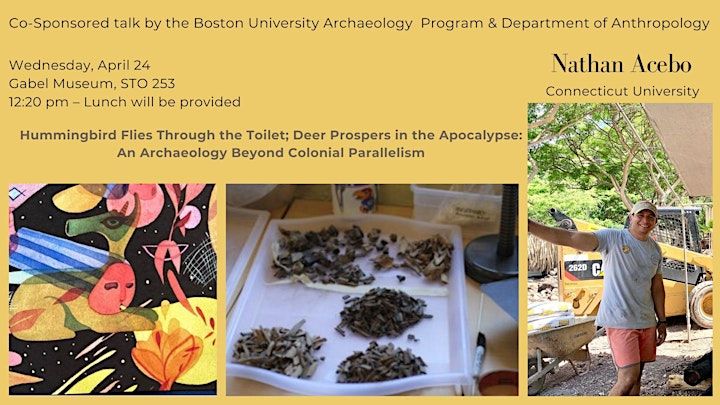
About this Event
The Archaeology Program and Department of Anthropology are co-sponsoring a lecture titled “Hummingbird Flies Through the Toilet; Deer Prospers in the Apocalypse: An Archaeology Beyond Colonial Parallelism.” We are thrilled to have, Nathan Acebo (University of Connecticut) joining us to share their work. The talk is Wednesday, April 24th in the Gabel Museum of Archaeology, STO 253, 675 Commonwealth Avenue, 12:20-1:10. Lunch will be provided. No ticket required, seats are limited.

Highlighted in the growing body of work on decolonial archaeologies, epistemic structures within archaeological research remain fraught with colonial designs and false simulations of Indigenous peoples[1]. This includes what Cutcha Risling Baldy (2015, 4–5) has termed colonial parallelism, a Western epistemic practice that highlights commonalities between cultural epistemologies while erasing autochthonous knowledge. There also appears to be a new anxiety that the time of interrogating grand epistemological questions (i.e., how should archaeological knowledge be produced) is fading in archaeology as community-based research and ontological perspectives increase in popularity[2]. Integrating Indigenous epistemologies into archaeology is often suggested as a potential remedy for both issues, however, it is unclear how seriously archaeology takes Indigenous storytelling. Practitioners of Indigenous Archaeology advocate for a balanced yet selective incorporation of Indigenous knowledge alongside Western epistemologies and practices⸺and less frequently⸺an asymmetrical commitment to Indigenous wisdom and ontologies as the foundation for imagining archaeology as one domain of ancestral storytelling. This talk is committed to the latter and examines power relationships in storytelling through different Indigenous Californians’ refusals of Indigenous alterity as epistemic cures for settlers' and archaeologists’ issues.
Information shared in this talk is indebted to the knowledge of and approved by collaborators from the Payómkawichum (Pechanga Band of Luiseño Mission Indians, Cultural Center), Tongva (Ti’at Society), and Acjachemen (Juaneño-Acjachemen Blas Adobe Culture Center) descendant communities.
[1] Lindsay Martel Montgomery, “The Archaeology of Settler Colonialism in North America,” Annual Review of Anthropology 51, no. 1 (October 24, 2022): 475–91; Tsim D. Schneider and Katherine Hayes, “Epistemic Colonialism: Is It Possible to Decolonize Archaeology?,” The American Indian Quarterly 44, no. 2 (June 6, 2020): 127–48.
[2] Oscar Moro Abadía and Emma Lewis-Sing, “The Decline of Epistemology in Archaeology: Comments on an Ongoing Discussion,” in Interdisciplinarity and Archaeology, ed. Laura Coltofean-Arizancu and Margarita Díaz-Andreu, Scientific Interactions in Nineteenth- and Twentieth-Century Archaeology (Oxbow Books, 2021), 203–24,
Nathan Acebo,
Assistant Professor
Department of Anthropology; Native American and Indigenous Studies (NAIS)
University of Connecticut
Event Venue & Nearby Stays
Archaeology Program, 675 Commonwealth Avenue, Boston, United States
USD 0.00
